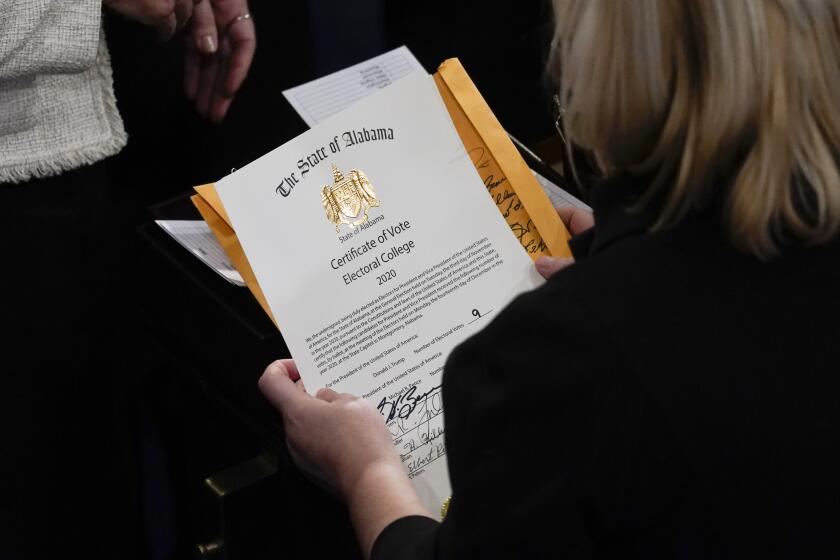Will delaying Obamacare’s individual mandate break the doc fix?

The House is set to vote Friday on an important healthcare bill that has either been sabotaged by anti-Obamacare Republicans or (unwittingly) rescued by them.
House Republicans have teed up a bill that would make a crucial change in Medicare, preventing a deep cut in doctors’ fees scheduled to go into effect April 1. But it would pay for it by postponing Obamacare’s requirement that all adult Americans buy health insurance until 2019 -- a move that, perversely, could drive up premiums in the individual market and leave even more people without coverage.
The proposal is electoral gold for Republicans, forcing Democrats who support healthcare reform in general and Obamacare (more formally known as the 2010 Patient Protection and Affordable Care Act) in particular to vote in favor of the unpopular individual mandate. With Obamacare threatening to be the albatross that sinks Democrats in the 2014 elections, Friday’s vote is sure to be fodder for many a GOP campaign ad.
PHOTOS: Obamacare -- and 8 other bungled launches
On the other hand, the proposal to postpone the individual mandate may simply be the bill’s ticket out of the House. And unless it can overcome that hurdle, the reforms it would make in Medicare won’t have a chance to become law.
The looming cut in physicians’ fees stems from a cost-control mechanism (the “sustainable growth rate”) designed to limit the growth of Medicare Part B, the optional coverage for doctors’ bills. Enacted in 1997, the SGR cuts the amounts paid to doctors whenever Part B grows faster than the U.S. economy. Part B costs have done that for more than a decade, but rather than let the SGR cuts go into effect, Congress has simply poured more tax dollars into Medicare.
Lawmakers have struggled for years to come up with a replacement for the SGR, and leaders of three key congressional committees finally agreed on one last month. Their bipartisan proposal, HR 4015, would allow little or no increase in fees for Medicare doctors over the next several years, but would give physicians financial incentives to move to alternative payment systems that promote more efficient, higher quality care.
One problem: they couldn’t agree on a way to pay for the change, which the Congressional Budget Office estimated would cost almost $140 billion more than letting the SGR cuts go into effect. Never mind that there was absolutely no chance of Congress following the latter course -- the CBO’s estimate is all that matters.
House Republican leaders eventually decided to cover that cost with a decidedly non-bipartisan amendment to HR 4015 that would delay the individual mandate. The change, which the House approved in a preliminary vote Thursday, drew a sharp critique from the American Medical Assn., which expressed “profound disappointment” that the bipartisan proposal to replace the SGR “has become a victim of partisan approaches to resolve budgetary issues.”
Of course, House leaders know that the proposed delay could never make it through the Democrat-controlled Senate. It’s also bad policy. As of Jan. 1, insurers are required to cover everyone who applies and forbidden to charge higher premiums to people who have pre-existing conditions. These changes give people a powerful incentive not to carry insurance until they need treatment. If they were allowed to do so, insurers would be left with a sicker, riskier group of people to cover, which would drive up premiums, leading fewer healthy people to carry insurance, driving up premiums more, and so on in a vicious spiral. Although an individual mandate isn’t the only way to prevent such gamesmanship, it’s telling that the House Republican proposal didn’t embrace any of the alternatives. Instead, the amendment to HR 4015 would just remove the mandate for five years.
The Senate, meanwhile, has yet to settle on a way to pay for the SGR fix. One idea Senate Democrats are considering -- and that House Democrats have also proposed -- is to offset the cost by reducing spending on overseas military deployments. But that spending is going to drop regardless, which is why budget hawks have called this approach an unacceptable gimmick. Another possibility, which the Wall Street Journal editorial board has endorsed, is to pass the SGR changes without offsetting spending cuts. That looks bad from the CBO’s standpoint, but in the real world, it will save money -- boatloads of it -- by gradually moving doctors into more efficient ways of caring for patients.
Regardless, House Republicans and Senate Democrats are going to have to agree on a way to proceed, and it won’t be by delaying the individual mandate or counting non-existent savings from the defense budget. That means getting to conference and negotiating, which can’t happen until the House and Senate pass their versions of the bill. As bad as the amendment to HR 4015 may be, at least it moves the bipartisan plan to replace the SGR one step closer to becoming law.
ALSO:
Twitter: @jcahealey
More to Read
A cure for the common opinion
Get thought-provoking perspectives with our weekly newsletter.
You may occasionally receive promotional content from the Los Angeles Times.











